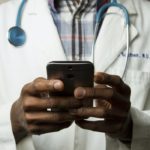 During the Covid-19 pandemic, doctors and other frontline medical staff have faced almost unimaginable stress as hospitals have been burdened like never before. This stress has largely been greeted with the unflinching gratitude of the general public, but research from Northwestern University highlights how this gratitude has not been universal.
During the Covid-19 pandemic, doctors and other frontline medical staff have faced almost unimaginable stress as hospitals have been burdened like never before. This stress has largely been greeted with the unflinching gratitude of the general public, but research from Northwestern University highlights how this gratitude has not been universal.
The study reveals that one in four physicians report being harassed and abused on social media during Covid, whether due to their race, their religion, or even their medical recommendations. The findings highlight the intensity of harassment doctors can face online.
“If anything, our data is likely an underestimate of the true extent of attacks and harassment post-pandemic since so many doctors started to advocate for public health measures during the pandemic and have been met with an increasingly polarized populace emboldened by leadership that devalues science and fact,” the researchers say.
Online abuse
The data found that one in four physicians has been personally attacked on social media, with these attacks coming in a range of forms. These include negative reviews, threats at work, having personal information shared online, and coordinated harassment. Indeed, some threats even included rape or death.
These threats were disproportionately targeted at women, with one in six female physicians reporting being sexually harassed online.
“We worry this emotionally distressing environment will drive women physicians off social media, which has been well-documented as a helpful career-advancement tool,” the researchers say. “Women in medicine are already less likely to hold leadership positions or be first or last authors of research, so disproportionately abstaining from a platform used for collaboration and networking due to sexual harassment and personal attacks should be a cause for concern.”
Getting support
Support against this abuse can be gained from trusted messengers, the authors suggest. This should also include clear plans in place by medical institutions to support their staff so that the work of physicians isn’t negatively impacted by online abuse.
“Doctors and other health care workers are already facing unprecedented stress and mental health challenges from their work,” the researchers explain. “Any stress from being online will compound that and put them at risk especially as doctors are being asked to be more vocal on social media to promote vaccination and more.”
The researchers have themselves created a coalition of healthcare professionals and physicians in the Illinois area, called the Illinois Medical Professionals Action Collaborative Team (IMPACT4HC). The group aims to educate and advocate for evidence-based solutions on social media.
“It feels much easier to advocate on social media as part of a group,” the researchers conclude. “The nice thing is that on #medtwitter, you are not alone. There are many who will come to your aid. And together, we not only have a louder voice but we can support each other though this stressful time.”